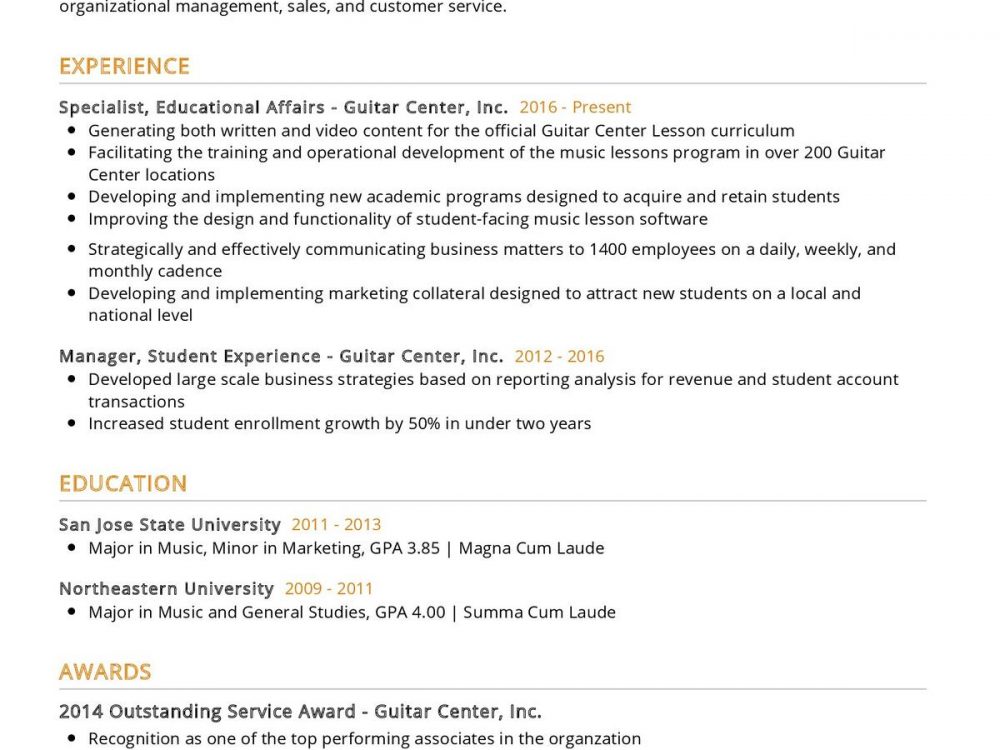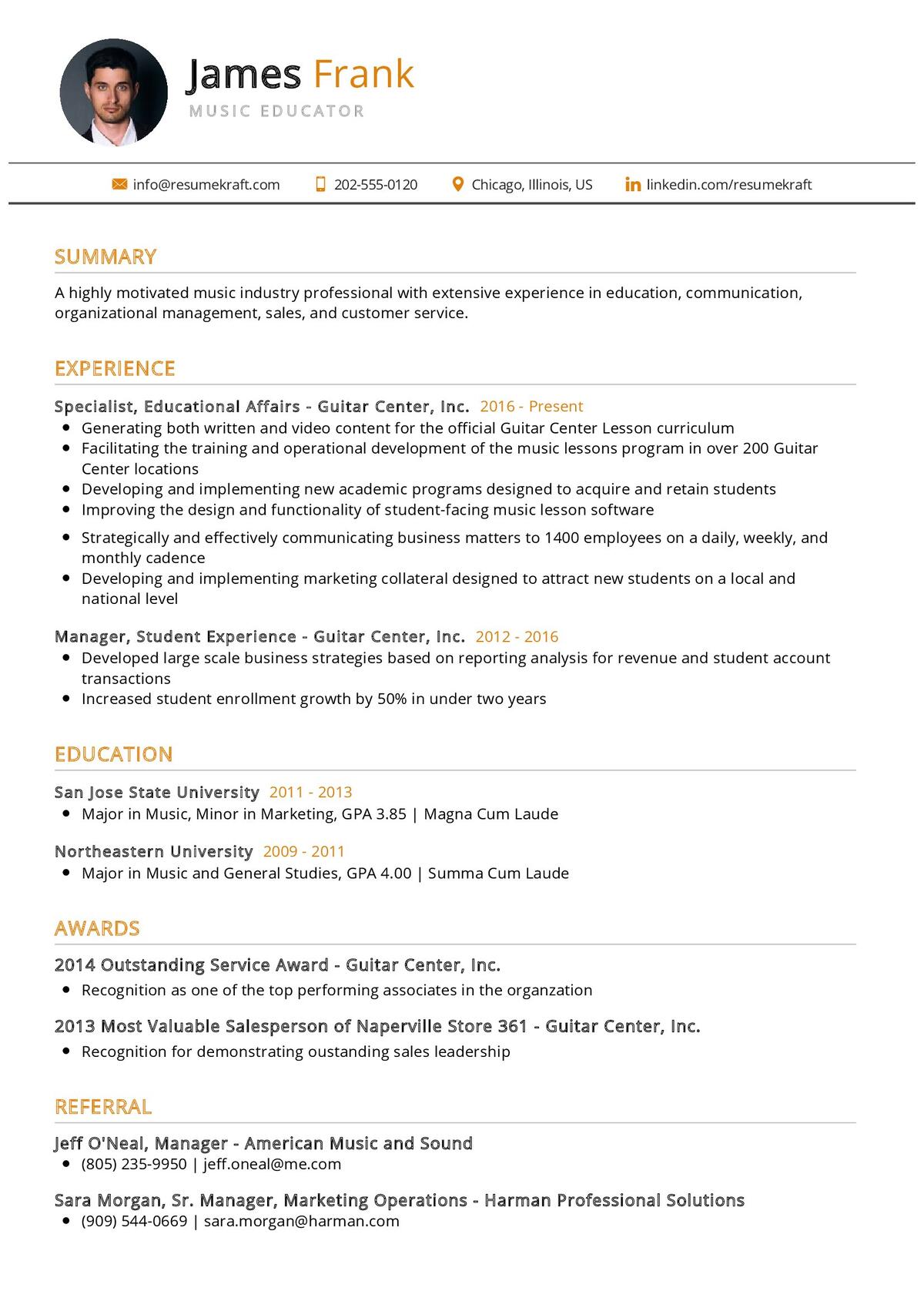What Should Be Included In A Music Educator Resume?
Writing a resume as a music educator can be an intimidating task. It’s important to include all of the relevant information in a concise and organized way. Your resume should be carefully crafted to highlight the unique skills and experiences that make you an ideal candidate. Here is a guide to what should be included in a music educator resume.
At the top of the resume, include your contact information such as your name, address, email, and phone number. This will make it easier for potential employers to reach out and contact you.
The next section should include your professional experience. List any positions that you’ve held in the past that are related to music education. Be sure to include details about the type of music or courses that you taught and the age groups you taught. Be sure to include any awards or recognitions that you’ve earned in your field.
In the next section, include any education you have in music education. This should include the school you attended, your degree and major, and any specialized training or certifications.
The last section should include any additional skills and experience that you have that could be beneficial to the position. Examples of these include proficiency in a particular instrument, technology skills, and any additional languages.
Writing a resume as a music educator can be a daunting task, but if you take the time to carefully craft your resume, you will be sure to highlight the unique skills and experiences that make you an ideal candidate. By including all of the relevant information in a concise and organized way, your resume can help you stand out as a qualified candidate.
What Skills Should I Put On My Resume For Music Educator?
As a music educator, having the right skills and qualifications on your resume is essential for getting the job you want. Your skills should reflect the job you are applying for and showcase what you can do. To make sure your resume stands out from the crowd, here is a list of some of the most important skills for a music educator to have:
Knowledge of Music Theory and Technique: It is important that a music educator has a deep understanding of both music theory and technique. This means being able to understand the structure of a piece of music, its components and how they come together to create a complete song. Being able to explain these concepts to students is also essential.
Teaching Skills: A music educator should have excellent teaching skills, such as being able to explain complex concepts in a clear and concise manner and being patient and encouraging with students. It is also important that a music educator is able to engage with students and keep them interested in the subject.
Organizational Skills: A music educator should be able to effectively manage their classroom and keep it organized. This means being able to stay on top of student assignments, recording attendance and grades, and ensuring that everyone is on task.
Musical Performance: Music educators should also have strong musical performance skills. This includes being able to sight read music, play an instrument, and be able to teach students how to perform a piece of music.
Creativity: It is important for a music educator to be creative when teaching, as this will help keep students engaged and interested in the subject. Having the ability to think outside the box and come up with interesting ways to teach is essential in order to be a successful music educator.
Communication Skills: A music educator must be able to effectively communicate with their students. This means being able to explain concepts in a way that is understandable, as well as being able to listen to students and address any questions or concerns they may have.
What Is The Job Description Of The Music Educator?
As a Music Educator, your role is to provide music instruction and mentorship to students of all ages. This may include teaching instrumental music, vocal music, and conducting classes in music theory and history. You will be responsible for leading classes, orchestras and choirs, as well as teaching private lessons and tutoring students on an individual basis. As a Music Educator, you must be able to motivate, engage, and inspire your students as they develop their musical talents.
You must have excellent communication skills, as well as a deep knowledge of music theory and history. Additionally, you must be able to work with other educators, parents, and school administrators to ensure the best possible outcome for your students. In order to be successful in the role of Music Educator, you must have a comprehensive understanding of music theory and history, as well as the skills to effectively teach and engage students of all ages.
Your resume should detail your qualifications, experience, and accomplishments as a music educator, as well as any additional achievements or activities that you feel are relevant to the job. Additionally, you should include any awards, certificates, or other accolades that you have received in the past.
What Is A Good Objective For A Music Educator Resume?
When crafting a resume for a music educator role, it is important to include an objective that outlines the primary purpose of your resume. A good objective should be concise, clear and reflect your key qualifications and skills.
When writing your objective, be sure to include any experience or qualifications that make you an ideal candidate for the position. For example, mention any teaching experience you have that relates to music education, such as teaching private lessons or leading a school music program. You should also include any specialized training or certifications that you have in music education, such as music production or audio engineering.
In addition, include any special skills that you possess that may be beneficial to the role. For example, if you are proficient in music software such as Pro Tools or Logic Pro, this should be included in your objective. You should also mention any other relevant skills, such as experience leading a choir or band, or teaching music theory.
By including an objective that reflects your qualifications and experience, you can ensure that your resume stands out from the competition and that you are the ideal candidate for the role.
What Are The Career Prospects In The Music Educator?
The career prospects for music educators are excellent. With the growing demand for music education in schools, universities, and other music-related institutions, there is no shortage of opportunities. For those who are passionate about teaching music, the job of a music educator can be extremely rewarding.
A music educator must possess strong communication and teaching skills, as well as a deep knowledge of music theory and music history. Depending on the position and the institution, a music educator may also need to have a master’s degree in music. It’s important to have a portfolio of teaching materials, student evaluations, and other documentation to show prospective employers.
In the K-12 setting, music educators must be knowledgeable about the specific age group and developmental levels of their students. They must be able to teach a variety of musical styles and techniques, as well as music theory, history, and appreciation. Music educators must also be able to design and implement lesson plans and collaborate with other teachers and staff to create an engaging and successful educational experience.
At the college level, music educators must have a comprehensive understanding of music theory, history, and composition. They must also have the ability to evaluate students’ performance and provide feedback. Additionally, professors may be responsible for teaching classes, conducting research, and writing publications.
Overall, music educators can find rewarding and challenging positions in many different educational settings. With the right qualifications, experience, and dedication, they can build a successful and fulfilling career.
Key Takeaways for an Music Educator resume
Writing a successful resume for a music educator position requires careful attention to detail. To shine in this field, it’s important to demonstrate your depth of knowledge and skill in the music education field. It’s also important to showcase your ability to work with a variety of different students and their individual needs. Here are some key takeaways to consider when writing a music educator resume:
- Demonstrate Knowledge and Skills: Highlight the knowledge and skills you possess that make you an excellent music educator. Include information on your music performance and teaching experience, as well as your knowledge of music theory, pedagogy, and curriculum development.
- Showcase Your Experience: Provide evidence of your music teaching experience, from private lessons to ensembles, by including details on the number of students you’ve taught, the settings you’ve taught in, and the achievements you’ve helped your students make.
- Talk About Your Creative Strengths: Demonstrate your creative and innovative strengths when writing your resume, so employers can appreciate the value you bring to the position. Discuss your ability to engage students with creative activities, activities that go beyond the standard classroom, and lead ensembles towards excellence.
- Focus on Your Achievements: Showcase your achievements in the resume. Include awards, accolades, and recognition that you’ve earned, as well as comments from students, parents, and colleagues.
- List Your Certifications: Include your certifications, such as Music Educator Certification, Continuing Education Units (CEUs), and other training in the music education field.


